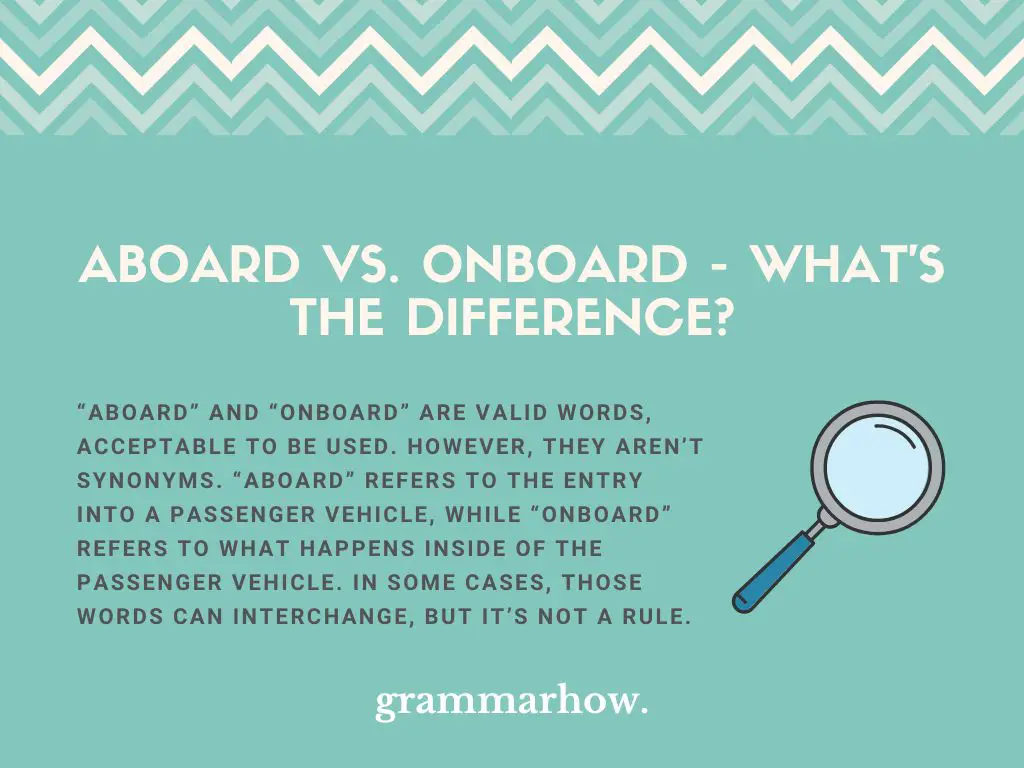Do you like traveling? If you do, you may have come across the words “Aboard” and “Onboard”. Do you know what those words mean?
We want to know what the words “Aboard” and “Onboard” stand for. We also want to know the appropriate way to use each. Let’s go!
Aboard vs. Onboard – What’s the Difference?
“Aboard” and “Onboard” are valid words, acceptable to be used. However, they aren’t synonyms. “Aboard” refers to the entry into a passenger vehicle, while “Onboard” refers to what happens inside of the passenger vehicle. In some cases, those words can interchange, but it’s not a rule.

Take a look at some examples:
- We walked aboard the ship, excited about our vacation.
- We walked onboard the ship, excited about our vacation.
- No smoking is permitted onboard the train.
- No smoking is permitted aboard the train. (incorrect)
- No smoking is permitted while boarding the train.
In the first set of sentences, we mention a walk toward or a walk on the ship. The sentences are identical, except for the fact that one uses the word “Aboard” and the other, the word “Onboard”.
The first sentence describes people going “Aboard” the ship. In other words, they were walking towards it, intending to board the vessel.
The second sentence describes people walking “Onboard” the ship. They could be walking on a deck, walking in some direction, etc. The word “Onboard” indicates they were already inside of the vessel, strolling around.
This first set shows that sometimes, “Aboard” and “Onboard” can interchange and still make a sentence grammatically accurate. However, because those words aren’t synonyms, that change shifts the message being conveyed.
The second set of sentences talks about smoking on a train. In that scenario, the correct form is “Onboard”, because the message is that people aren’t allowed to smoke when they’re inside the train.
However, “Aboard” also works. It’s not perfect but the sentence isn’t incorrect. If smoking wasn’t allowed while going on the train, the correct form would be the third sentence – which doesn’t include neither “Onboard” nor “Aboard”.
Aboard
“Aboard” usually indicates entering a passenger vehicle. It’s a word mostly used specifically to refer to the moment in time when people are entering the vehicle. However, in some cases, it can also indicate simply being in a vehicle.
The Cambridge Dictionary agrees with our definition, but expands it a bit, by saying that “Aboard” is to go “on or onto a ship, aircraft, bus, or train”.
Let’s take a look at some examples:
- All aboard!
- Carol spent weeks aboard the ship.
- The attendant welcomed us aboard.
- The bus drove off just before I could climb aboard.
- For some reason, he was not allowed aboard the ship.
Onboard
“Onboard” indicates an event or situation is carried out or occurs “Aboard” a passenger vehicle. It’s a less strict usage than “Aboard” because it can be connected to anything happening inside of the vehicle. It can also be used figuratively.
The Cambridge Dictionary adds to that, explaining that “Onboard” can also be “to give new employees the knowledge and skills they need to become effective members of an organization”.
- So, do you like my idea? Are you onboard?
- The onboard computer system of the ship was glitching.
- The cruise ship offered many perks, such as onboard entertainment.
- Howard will go through the onboarding process next week.
- Is there a bathroom onboard?
Which Is Used the Most?
Which one of those forms is used more often, “Aboard” or “Onboard”? Take a look at the graph from Google Ngram Viewer below.

The word “Aboard” is used with much more frequency. It’s been relevant for a longer time and has always been the most used one.
“Onboard” became relevant around 1960 and since then has been growing in usage. Both words are correct and you can use them if you want.
Final Thoughts
“Aboard” and “Onboard” are acceptable words, but they aren’t synonyms. Use “Aboard” when describing the entry into a passenger vehicle. Use “Onboard” when describing something that happens inside of the passenger vehicle. Because they have different meanings if you interchange them in a sentence the message may be affected.
